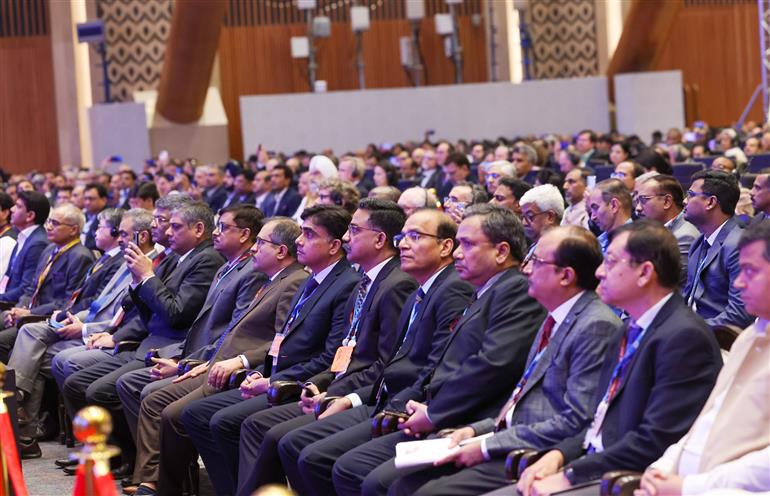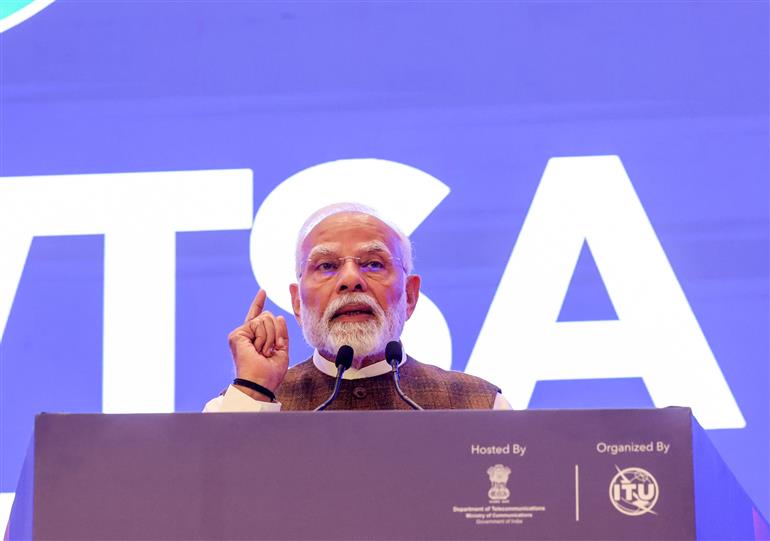New Delhi, October 15, 2024 – In a significant event that highlights India’s growing influence in global telecommunications portraying India’s Leadership in Telecom, Prime Minister Shri Narendra Modi inaugurated the International Telecommunication Union (ITU) World Telecommunication Standardization Assembly (WTSA) 2024 at Bharat Mandapam, New Delhi. Simultaneously, the Prime Minister also opened the 8th edition of the India Mobile Congress (IMC) 2024, an event widely regarded as Asia’s largest digital technology forum. The dual inaugurations signal India’s firm step towards becoming a global hub for technological innovation and standard-setting in telecommunications.

During his address, Prime Minister Modi welcomed global dignitaries, including Union Minister for Communication Shri Jyotiraditya Scindia, Minister of State for Communication Shri Chandrasekhar Pemmasani, ITU Secretary-General Ms. Doreen Bogdan-Martin, and leaders from the telecom industry, foreign governments, and startups. He expressed gratitude to the ITU for choosing India as the venue for WTSA, marking the first time the assembly has been hosted in the Asia-Pacific region.
India’s Telecom Revolution and Leadership in Telecom
Prime Minister Modi noted India’s remarkable journey in telecommunications, citing the rapid expansion of mobile phone users, with over 120 crore (1.2 billion) mobile subscribers and 95 crore (950 million) internet users. He highlighted India’s success in enabling digital transactions, stating that the country handles more than 40% of global real-time digital transactions.
“India has transformed telecom from just a medium of connectivity to a medium of equity and opportunity,” Modi said, underscoring how telecom infrastructure has bridged the gap between urban and rural populations and between rich and poor. He emphasized the role of telecom in delivering last-mile services efficiently, a cornerstone of the country’s Digital India vision.
Four Pillars of Digital India
Recalling his 2014 vision for a digitally connected India, Prime Minister Modi spoke about the four pillars that have driven India’s digital transformation: affordable devices, wide-reaching digital connectivity, accessible data, and a “Digital First” approach. These pillars, he said, have enabled India to democratize digital technology and create platforms that foster innovation and new opportunities, particularly through the JAM Trinity (Jan Dhan, Aadhaar, Mobile).
One of the standout achievements noted by the Prime Minister was the installation of optical fiber networks, which span eight times the distance between the Earth and the Moon, in just ten years. He also highlighted India’s rapid adoption of 5G technology, with almost every district now connected, making India the world’s second-largest 5G market.
Telecom as a Global Good
With the ITU-WTSA and IMC occurring simultaneously, the Prime Minister stressed the convergence of global standards and service platforms, describing the events as a merger of “consensus and connectivity.” He pointed to India’s mission of global collaboration, referencing the country’s leadership in the G20 Summit and the principle of “Vasudhaiva Kutumbakam” (One Earth, One Family, One Future).
Modi also highlighted India’s significant role in the 21st-century telecom revolution. He outlined India’s vision of producing fully “Made in India” phones, from chip design to final assembly. The Prime Minister emphasized that India’s telecom journey is a model for the world, driven by the idea that digital technology must be inclusive and available to all.
Global Framework for Digital Technology
A key point in Prime Minister Modi speech was the need for a global governance framework for digital technology. Modi called upon global institutions to recognize the importance of a collaborative approach to digital governance, stressing that standards must be inclusive, secure, and adaptable to future challenges like artificial intelligence, data privacy, and ethical AI. He also urged for global cooperation in addressing cyber threats, emphasizing the critical role of international collaboration in securing the digital future.
Women Empowerment in Technology
Prime Minister Modi highlighted the importance of women-led development in the technology sector, underscoring India’s commitment to creating opportunities for women in science, technology, engineering, and mathematics (STEM). He noted the increasing participation of women in leadership roles within India’s technology landscape, from space missions to startups, and praised initiatives like the Namo Drone Didi program and the Bank Sakhi program for their role in empowering women through technology.
Concluding his address, Prime Minister Modi reiterated India’s commitment to creating a strong, secure, and inclusive digital future. He emphasized the need for innovation with inclusion, urging global stakeholders to ensure that no community or region is left behind in the digital revolution. With the WTSA and IMC 2024, India aims to continue its leadership in setting the global telecom agenda and advancing digital public infrastructure for the world.
Union Minister Shri Jyotiraditya Scindia and Union Minister of State Shri Chandrasekhar Pemmasani, along with global industry leaders, were present at the inauguration, which is set to shape the future of global telecommunications standards.





